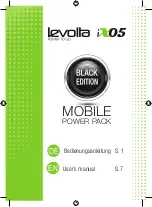
Technical Documentation
© Zennio Avance y Tecnología S.L. Edition 4 Further information
Page
2
/
2
INPUTS: SPECIFICATIONS AND CONNECTIONS
BATTERY REPLACEMENT
SAFETY INSTRUCTIONS
Installation should only be performed by qualified electricians following applicable regulations on preventing accidents, as
required by law.
Do not connect Mains Voltage (230VAC) or any other external voltages to any point of the BUS.
Connecting an external voltage might put the entire KNX system at
risk.
Make sure during the installation that there is always sufficient insulation between the mains voltage 230VAC and the
bus or the extension inputs.
Once the device is installed, the terminals should not be accessible.
The WEEE logo means that this device contains electronic parts and it must be discarded properly following the
http://zennio.com/weee-regulation
Concept
Description
Number of S0 or dry inputs
4
Minimum pulse length
30ms
Inputs connection
Terminal block (screw)
Inputs per common
2
Cable section
0.5mm
2
a 2.5mm
2
(24-12 AWG)
Max. cable length
30m
Cable type
Stranded or solid wire
Operating voltage
6VDC
1.
Extract the battery holder from the upper
side of KCI. It is recommended to have the
bus KNX connected during this process to
prevent S0 pulses loss.
2.
Place the batteries in the battery holder (respecting the polarity
shown) and insert it as indicated in the figure.
Figure 2:
Example of connections with SO pulse generators
Attaching KCI to DIN rail:
Removing KCI from DIN rail:
INSTALLATION OF KCI ON A DIN RAIL
Figure 3:
Mounting KCI on a DIN rail




















